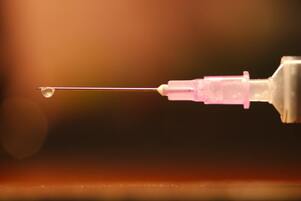Laurie Anne Walden, DVM  Photo by Raghavendra V. Konkathi Photo by Raghavendra V. Konkathi Vaccines for dogs and cats are safe, especially compared with the risk of disease. Most animals don’t have any untoward symptoms after receiving a vaccine. But vaccines, like any other medicine, can have some side effects. Vaccination produces an immune response, and inflammation is part of the immune response. Most of the symptoms (if any) that animals have after vaccination are caused by normal inflammation, meaning that the immune system is acting the way it’s supposed to act when it’s stimulated. Allergic (hypersensitivity) reactions to vaccines are uncommon in dogs and cats but can be serious. These reactions are caused by an inappropriate immune response. The most severe type of hypersensitivity reaction is anaphylaxis, which can be life threatening. In one study of dogs in the United States, the rate of vaccine-associated adverse events, including everything from normal inflammatory responses to anaphylaxis, was 0.38% (38 events per 10,000 vaccine doses). Anaphylaxis accounted for 1.7% of the adverse events. The risk of adverse events was highest in small-breed dogs and dogs who received multiple vaccines at the same time.[1] Mild Symptoms These are some of the common mild vaccine effects you might notice in your dog or cat. In most cases it’s safe to monitor these symptoms at home. If any of these symptoms last longer than a day or if your pet seems very uncomfortable, contact your veterinarian.
More Serious Symptoms Allergic reactions to vaccines appear minutes or several hours after vaccination. Anaphylaxis can start with these symptoms and is a medical emergency. Seek veterinary care right away if your pet has any of these symptoms.
Lumps at Injection Sites Most small, firm lumps at vaccine injection sites are caused by inflammation and resolve in a couple of weeks without treatment. An injection-site lump or swelling that is still present after 3 weeks or is enlarging should be checked by a veterinarian. Injection-site cancer is rare but can happen in cats (vaccine protocols and formulations for cats minimize this risk as much as possible). Autoimmune Disease? Vaccines could—at least in theory—be linked to autoimmune diseases, in which the immune system targets cells of the body. Immune-mediated hemolytic anemia (affecting red blood cells) and thrombocytopenia (affecting platelets) occur in animals, but the association of these disorders with vaccination isn’t clear.[2] The presence of an autoimmune disease would affect future vaccination decisions for the animal, though. If Your Pet Has Had a Vaccine Reaction Tell your veterinarian if your pet has had any vaccine-related symptoms. Your veterinarian will determine if your pet most likely had a normal inflammatory response or an allergic reaction. The decision on how to proceed with future vaccinations depends on the symptoms, the animal’s overall health, and the animal’s individual risk for vaccine-preventable diseases. Depending on the circumstances, options for future vaccinations might include dividing vaccines among several visits instead of giving multiple vaccines all at once, giving medication (like an antihistamine) before vaccination, using a different type of vaccine, or discontinuing a vaccination. Vaccine titers—levels of antibody in the blood—indicate whether an animal is likely to still be protected by earlier vaccines, so titer testing can replace vaccination in some cases.[3] Some of these options don’t apply to rabies vaccination, which is mandated by law. In North Carolina and South Carolina, as in many states, veterinarians cannot give medical exemptions for rabies vaccination, and rabies antibody titers can’t be used instead of vaccination.[4] References 1. Moore GE, Guptill LF, Ward MP, et al. Adverse events diagnosed within three days of vaccine administration in dogs. J Am Vet Med Assoc. 2005;227(7):1102-1108. doi:10.2460/javma.2005.227.1102 2. Tizard IR. Adverse consequences of vaccination. Vaccines for Veterinarians. 2021;115-130.e1. doi:10.1016/B978-0-323-68299-2.00019-8 3. AAHA canine vaccination guidelines: vaccine adverse reactions. American Animal Hospital Association. Accessed August 27, 2021. https://www.aaha.org/aaha-guidelines/vaccination-canine-configuration/frequently-asked-questions/how-can-adverse-reactions-be-managed/ 4. Rabiesaware.org. Accessed August 27, 2021. http://www.rabiesaware.org/ Photo by Raghavendra V. Konkathi on Unsplash Comments are closed.
|
AuthorLaurie Anne Walden, DVM Categories
All
Archives
June 2024
The contents of this blog are for information only and should not substitute for advice from a veterinarian who has examined the animal. All blog content is copyrighted by Mallard Creek Animal Hospital and may not be copied, reproduced, transmitted, or distributed without permission.
|
- Home
- About
- Our Services
- Our Team
-
Client Education Center
- AKC: Spaying and Neutering your Puppy
- Animal Poison Control
- ASPCA Poisonous Plants
- AVMA: Spaying and Neutering your pet
- Biting Puppies
- Boarding Your Dog
- Caring for the Senior Cat
- Cats and Claws
- FDA warning - Bone treats
- Force Free Alliance of Charlotte Trainers
- Getting your Cat to the Vet - AAFP
- Holiday Hazards
- How To Feed Cats for Good Health
- How to Get the Most Out of your Annual Exam
- Indoor Cat Initiative - OSU
- Introducing Your Dog to Your Baby
- Moving Your Cat to a New Home
- Muzzle Training
- Osteoarthritis Checklist for Cats
- What To Do When You Find a Stray
- Our Online Store
- Dr. Walden's Blog
- Client Center
- Contact
- Cat Enrichment Month 2024
|
Office Hours
Monday through Friday 7:30 am to 6:00 pm
|
Mallard Creek Animal Hospital
2110 Ben Craig Dr. Suite 100
|
Site powered by Weebly. Managed by IDEXX Laboratories

 RSS Feed
RSS Feed